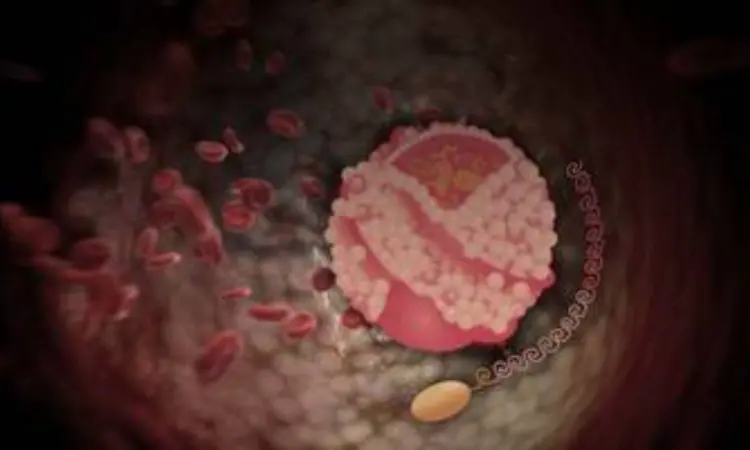- Home
- Medical news & Guidelines
- Anesthesiology
- Cardiology and CTVS
- Critical Care
- Dentistry
- Dermatology
- Diabetes and Endocrinology
- ENT
- Gastroenterology
- Medicine
- Nephrology
- Neurology
- Obstretics-Gynaecology
- Oncology
- Ophthalmology
- Orthopaedics
- Pediatrics-Neonatology
- Psychiatry
- Pulmonology
- Radiology
- Surgery
- Urology
- Laboratory Medicine
- Diet
- Nursing
- Paramedical
- Physiotherapy
- Health news
- Fact Check
- Bone Health Fact Check
- Brain Health Fact Check
- Cancer Related Fact Check
- Child Care Fact Check
- Dental and oral health fact check
- Diabetes and metabolic health fact check
- Diet and Nutrition Fact Check
- Eye and ENT Care Fact Check
- Fitness fact check
- Gut health fact check
- Heart health fact check
- Kidney health fact check
- Medical education fact check
- Men's health fact check
- Respiratory fact check
- Skin and hair care fact check
- Vaccine and Immunization fact check
- Women's health fact check
- AYUSH
- State News
- Andaman and Nicobar Islands
- Andhra Pradesh
- Arunachal Pradesh
- Assam
- Bihar
- Chandigarh
- Chattisgarh
- Dadra and Nagar Haveli
- Daman and Diu
- Delhi
- Goa
- Gujarat
- Haryana
- Himachal Pradesh
- Jammu & Kashmir
- Jharkhand
- Karnataka
- Kerala
- Ladakh
- Lakshadweep
- Madhya Pradesh
- Maharashtra
- Manipur
- Meghalaya
- Mizoram
- Nagaland
- Odisha
- Puducherry
- Punjab
- Rajasthan
- Sikkim
- Tamil Nadu
- Telangana
- Tripura
- Uttar Pradesh
- Uttrakhand
- West Bengal
- Medical Education
- Industry
Single dose of lepodisiran reduces lipoprotein A more than 94 percent for a year: JAMA

Researchers have found in a phase 1 study of 48 participants with elevated lipoprotein(a) levels that lepodisiran was well tolerated and produced dose-dependent, long-duration reductions in serum lipoprotein(a) concentrations. The findings support further study of lepodisiran, which is a short interfering RNA directed at hepatic synthesis of apolipoprotein(a), an essential component necessary for assembly of lipoprotein(a) particles
Further research by Cleveland Clinic physician shows that a single dose of an experimental therapy produced greater than 94% reductions in blood levels of lipoprotein(a), a key driver of heart disease risk, with the results lasting for nearly a year.
Results from the “Efficacy and Safety of Lepodisiran: An Extended Duration Short-Interfering RNA Targeting Lipoprotein(a) Study” were presented today during a late-breaking science session at the American Heart Association’s Scientific Sessions 2023 and simultaneously published in the Journal of the American Medical Association.
Lipoprotein(a), often shortened to just Lp(a), is made in the liver and has similarities to LDL, also known as low-density lipoprotein or “bad cholesterol.” Unlike other types of cholesterol particles, Lp(a) levels are 80-90% genetically determined. The structure of the Lp(a) particle causes the accumulation of plaque in arteries which greatly increases the risk of heart attacks and strokes.
Although effective therapies exist to reduce the risk of heart disease by lowering LDL cholesterol and other lipids, currently there are no approved drug treatments to lower Lp(a). Since Lp(a) levels are determined by a person’s genes, lifestyle changes (diet or exercise) have no effect.
In the trial, participants who received an injection of lepodisiran had lipoprotein(a) levels reduced by the top dose as much as 96% within two weeks and maintained levels more than 94% below baseline for 48 weeks. The drug is a small interfering RNA (siRNA) therapeutic that blocks the messenger RNA needed to manufacture a key component of lipoprotein(a) in the liver.
The findings add lepodisiran to the growing list of therapies that could be promising treatments for atherosclerotic cardiovascular diseases in people with high levels of Lp(a), which is estimated to affect 64 million people in the United States and 1.4 billion people worldwide.
“These results showed that this therapy was well tolerated and produced very long-duration reductions in Lp(a), an important risk factor that leads to heart attack, stroke and aortic stenosis,” said lead author Steven Nissen, M.D., Chief Academic Officer of the Heart, Vascular & Thoracic Institute at Cleveland Clinic.
In the trial, researchers enrolled 48 patients in the U.S. and Singapore with a mean age of 47. Investigators studied six different dosages and a placebo, which were all administered as injections. Participants were monitored for up to 48 weeks after administration.
Maximum Lp(a) plasma concentrations were reduced by 49% from baseline levels for the 4 mg dose and up to 96% for the 608 mg dose vs. a 5% decrease for the placebo. No safety issues were observed, and the only tolerability issue was mild injection site reactions.
“Despite the strong evidence of the importance of elevated Lp(a) as a risk factor for heart disease, effective treatment has been elusive,” said Dr. Nissen. “This approach to treatment gives hope to the 20% of the world’s population who have elevated Lp(a) levels.”
A phase 2 trial studying lepodisiran is currently underway. The trial was sponsored by Eli Lilly and Company (Lilly), the company developing lepodisiran.
Reference:
Trial shows a single dose of an experimental therapy reduces lipoprotein(a), an important heart disease risk factor, more than 94% for nearly a year, Cleveland Clinic, Meeting: AHA Resuscitation Science Symposium 2023
Dr Kamal Kant Kohli-MBBS, DTCD- a chest specialist with more than 30 years of practice and a flair for writing clinical articles, Dr Kamal Kant Kohli joined Medical Dialogues as a Chief Editor of Medical News. Besides writing articles, as an editor, he proofreads and verifies all the medical content published on Medical Dialogues including those coming from journals, studies,medical conferences,guidelines etc. Email: drkohli@medicaldialogues.in. Contact no. 011-43720751


